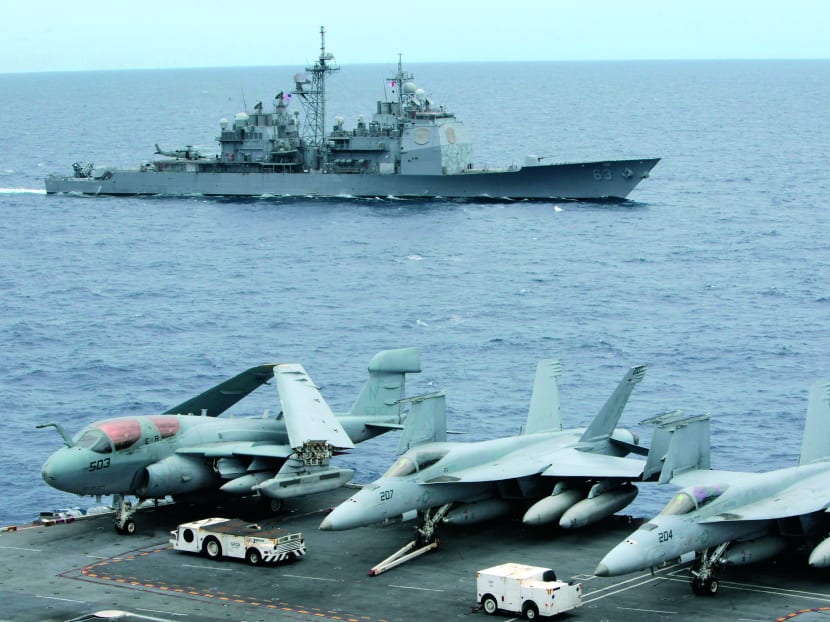US might boost sea patrols near islands claimed by China
WASHINGTON/HONG KONG — The US may more aggressively patrol the disputed South China Sea as it searches for answers from China on the purpose of its reclamation work in the area, a move that raises the risk of a confrontation between their militaries.

U.S fighter jets on standby at the upper deck of a USS George Washington aircraft carrier while a U.S. Cowpens ship pass during a media tour at the South China Sea, 170 nautical miles from Manila September 3, 2010. Photo: Reuters
WASHINGTON/HONG KONG — The US may more aggressively patrol the disputed South China Sea as it searches for answers from China on the purpose of its reclamation work in the area, a move that raises the risk of a confrontation between their militaries.
Defence Secretary Ashton Carter has asked the Pentagon to consider options for using extra land and sea-based surveillance aircraft and naval vessels to underscore the freedom of navigation in the South China Sea, according to a defence official with direct knowledge of the discussions. The official spoke on the condition of anonymity because the planning is classified.
China claims more than 80 per cent of the South China Sea, which carries some of the world’s busiest shipping lanes. It has quadrupled its land reclamation to 8.1sqkm and begun construction of at least one airstrip on the new islands, prompting protests from other claimant states including the Philippines. The US is treaty bound to defend its Asian ally in a conflict with China.
The official confirmed a Wall Street Journal report that one option under consideration is using aircraft and ships to challenge China’s willingness to enforce a 22km exclusion zone around the islands and other territory it contests in the area.
‘CLOSE NOTICE’
Mr David Shear, assistant secretary of defence for Asian and Pacific security affairs and a former US ambassador to Vietnam, neither confirmed nor denied the report when asked about it at a hearing yesterday (May 13) of the Senate Foreign Relations Committee.
“In general, the Chinese take close notice of our freedom of navigation operation in the South China Sea,” Mr Shear said. “We’re going to continue exercising that right both on the surface of the water and in the air.”
Any move by the US to challenge China’s jurisdictional claims “raises the prospect of more aggressive encounters between the US and China’s military both at sea and in the air”, said Dr Ian Storey, a senior fellow at the Institute of South-east Asian Studies in Singapore.
AIR ZONES
China’s foreign ministry said last week it reserves the right to establish an air defence identification zone over the South China Sea. US military officials have said that China may seek to install long-range detection radars, and base warships and warplanes on the new islands to possibly enforce such a zone.
In November 2013, China established a zone over islands in the adjacent East China Sea also claimed by Japan, prompting the US to fly B-52 bombers into the area to challenge its enforcement.
China says its right to carry out its reclamation is undisputed, even as five other nations also lay claim to parts of the South China Sea.
“We express grave concern about the relevant US remarks,” Foreign Ministry spokeswoman Hua Chunying said yesterday at a briefing in Beijing. “It’s necessary for the US to provide clarification.”
‘STAY FIRM’
“China advocates the freedom of navigation in the South China Sea, yet the freedom definitely does not mean that foreign military vessels and aircrafts can enter one country’s territorial waters and airspace at will,” Ms Hua said. “China will stay firm in safeguarding territorial sovereignty.”
Ms Hua has said China would use the islands to provide aid for navigation and search-and-rescue operations as well as marine meteorological forecasting and fishery services for China and neighbouring countries. China may also use the islands for military purposes, she said.
“The Obama administration knows that it cannot stop China from building these things, so it is really aiming at trying to influence how China uses them,” said Ms Bonnie Glaser, a senior adviser for Asia at the Center for Strategic and International Studies in Washington.
China may have accelerated its reclamation given a legal challenge by the Philippines in the United Nation’s Permanent Court of Arbitration in The Hague. The Southeast Asian nation asked the court to uphold its right to exploit waters within its 40.7km exclusive economic zone under the UN Convention on the Law of the Sea, much of which falls within China’s claimed area.
“It was that submission that provoked China into moving forward with these reclamation projects because the atolls were explicitly identified,” said Dr Storey.
SUBMERGED FEATURES
The Philippines asked the tribunal to determine if the features were submerged, in which case they cannot generate a 22.2km area over which China could exercise sovereignty, Dr Storey said.
The US official said additional US military activity would involve an increase in the frequency and range of current surveillance and patrol missions, which include photo reconnaissance and other satellite monitoring of commercial shipping and military activity.
The official declined to say if the options include moving more aircraft or warships to Guam or elsewhere in the region, or requesting temporary basing rights at Subic Bay or Clark Field in the Philippines, or Cam Ranh Bay in Vietnam. Such issues may come up on the sidelines of the Shangri-La Dialogue of defence officials, which Mr Carter plans to attend this month in Singapore, the official said.
The South China Sea, Malacca Strait and other regional waters are critical to the energy supplies and economies of East Asia – including China – the official said, adding that the point has been made to Chinese officials in an effort to prevent tensions from escalating further. BLOOMBERG






